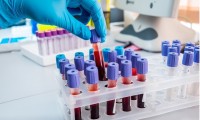-
Amylyx Withdraws ALS Drug From Market; Restructuring Will Slash 70% of Staff
- Source: drugdu
- 276
- April 8, 2024
-
Johnson & Johnson Set to Acquire Shockwave Medical, Aiming to Strengthen Company’s MedTech Division
- Source: drugdu
- 282
- April 8, 2024
-
Beckman Coulter receives FDA warning letter
- Source: drugdu
- 453
- April 8, 2024
-
Simple Blood Test Combined With Personalized Risk Model Improves Sepsis Diagnosis
- Source: drugdu
- 414
- April 8, 2024
-
Legend Biotech’s “CARVYKTI®” was approved for second-line indications in the United States
- Source: drugdu
- 363
- April 8, 2024
-
World Health Organization launches AI-powered digital health assistant for public health
- Source: drugdu
- 341
- April 8, 2024
-
myTomorrows and brainstrust partner to support patients living with brain cancer
- Source: drugdu
- 508
- April 8, 2024
-
Key mechanism controlling bone marrow stem cells could lead to new therapies
- Source: drugdu
- 449
- April 8, 2024
-
RemeGen’s Telitacicept (RC18) Granted Fast Track Designation by United States FDA for Treatment of Primary Sjögren’s Syndrome
- Source: drugdu
- 573
- April 8, 2024
your submission has already been received.
OK
Subscribe
Please enter a valid Email address!
Submit
The most relevant industry news & insight will be sent to you every two weeks.

















